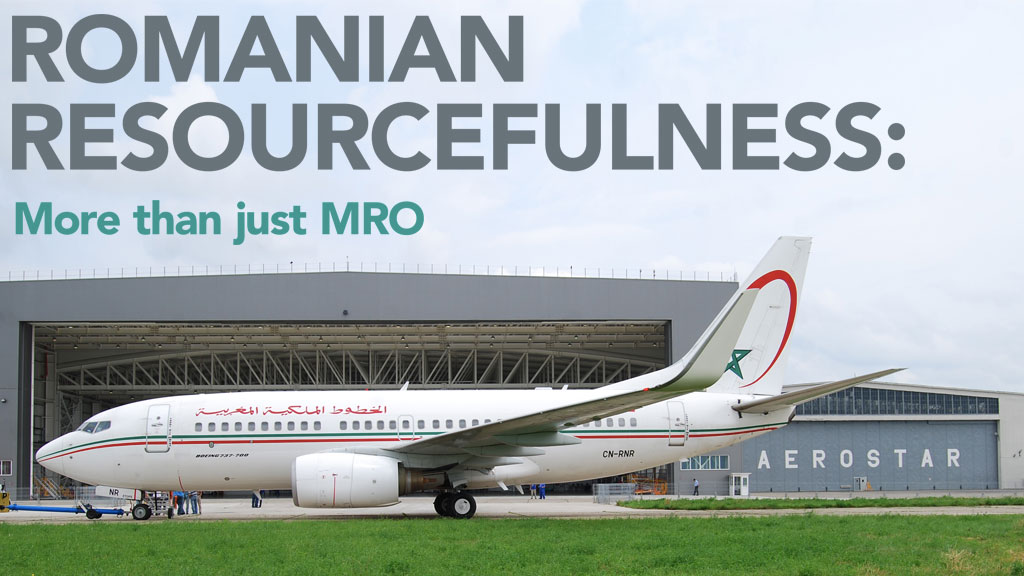Romania is not perhaps the first country that comes to mind when thinking of an organisation with a traditional MRO base in both the civil and military sectors, but Aerostar S.A. is not only maintaining its heritage but investing in new machinery and in expanding its facilities.
Aerostar S.A has a founding in military aircraft manufacture and maintenance which was established back in 1953 at Bacau airfield, in eastern Romania. The first fighter aircraft built in the country after the Second World War was the Avioane Craiova IAR-93 Vultur. It was intended to replace MIG-15s and MIG-17s and was a joint programme between Romania and Yugoslavia. The prototype was build by Aerostar and the maiden flight was made at Bacau on 31 October, 1974. In terms of military business, the company now has a reputation for maintaining the Romanian Air Force’s fleet of MIG-21 LanceRs, but more of that later.
Aerostar is an organisation that has developed three main strands of business: commercial MRO, military MRO; and aerostructure and component manufacturing and assembly which now accounts for nearly 50 percent of its business. The organisation is based and operates from the Bacau airfield with a spread of facilities including two main hangers dedicated to civil MRO; the first an older style three bay hanger, the second a newer four bay hanger of 5,000m² which was opened in the summer of 2012. Combined this provides around 10,000m² of hanger space dedicated to MRO activity.
Aerostar is an approved Part-145 maintainer, with this side of the business being focused on the provision of C and D checks for MRO commercial aircraft, particularly the Boeing 737 aircraft series 200-900, Airbus 320 family and BAe 146 100-300 / AVRO RJ.
Dragos Sfirlea, Aerostar’s quality and environmental manager, said during a visit by AVM this summer that the MRO business was increasing year by year. Not all of the customers are located within the European Union he pointed out. Since diversifying into commercial aviation MRO activities nearly 13 years ago, Aerostar has actively built up its customer base from airlines based in Europe, the Middle East, and Africa. These now include Royal Air Moroc (RAM) and Pegasus Airlines (Turkey), as well as a couple of well known holiday travel airlines
During 2016 a total of 80 aircraft completed ‘C’ and ‘D’ Checks at Bacau. Since the company moved into commercial aviation MRO activities some 500 aircraft from around 30 airlines have been overhauled at Bacau.
“We have five teams per aircraft plus and avionics team: they each address one area – fuselage, hydraulics, flight controls, engines and APU, structural, and finally avionics,” said Sfirlea. Between 20-30 people are assigned to each aircraft. They all report to an aircraft manager linked to the customer’s representative. If problems arise, then they can take decisions quickly. “We keep expendables but not rotables. We do a pre-arrival check for each aircraft to ensure that we have the right materials and equipment for every type of aircraft due to arrive. If there is one that we have not worked on before, we buy or rent the required tools, depending on if it will be a one-off or regular work,” he said.
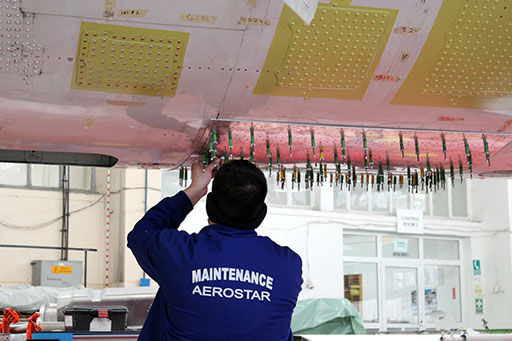
“Our objective is to become a ‘one-stop-shop’ for maintenance,” said Sfirlea. The drive is to form mid- and long-term framework agreements with airlines beyond the more standard yearly maintenance contracts. There has been an investment both in tooling and in the training of engineers and other personnel across the business. The company already holds approvals from EASA/RoCAA, Morocco, UAE, Turkey, Ukraine, Ghana, Bermuda, Aruba and Guernsey.
Sfirlea added that a new test stand was being built for hydraulic fuses. Such additions are important for reducing turnaround times. Anything the company can add to its maintenance portfolio that reduces the number of items that have to be sent to other suppliers means a quicker fix leading to the job completed on time.
“Our business is not buying and selling parts for MRO,” added Sfirlea. “Sometimes customers pre-deliver parts before the aircraft, sometimes they come with the aircraft, sometimes they ask us to by the parts for them. But we are conducting scheduled maintenance and we want to ensure the quickest turn-around. The usual C checks will last around five days but the D checks can be much longer, sometimes up to a month”
Manufacturing base
Aerostructures, components and assemblies, not to mention landing gear and hydraulic systems are providing around 50 percent of the company’s revenue. Walking around the machine shops and there are many new additions which have been added in recent years. This part of Aerostar’s business dynamic and growing.
“We consider 2016 as the year Aerostar was fully recognised for its position in the civil aviation manufacturing market,” stated Doina Matanie, Aerostar’s marketing manager. “We are a major supplier of the shroud box assembly for the wing of the Airbus A320 family, with our initial customer Airbus UK then GKN. Our production rate is growing each year and we now supply about 50 percent of total assemblies. We are also sole supplier for Gulfstream landing gear doors: we produce vanes, air brakes, and spoilers for Dassault Falcon 7X; as well as millions of parts for various aircraft programmes. We now supply around 30 ship-sets of shroud boxes per month. We also supply more than 50 percent of certain categories of hydraulic actuators. We also provide components for the Airbus 320Neo in the lower arm landing gear.” Matanie points out that many of these are relatively new programmes that will allow Aerostar to continue to build its reputation in supply integrators for the mid- to long-term.
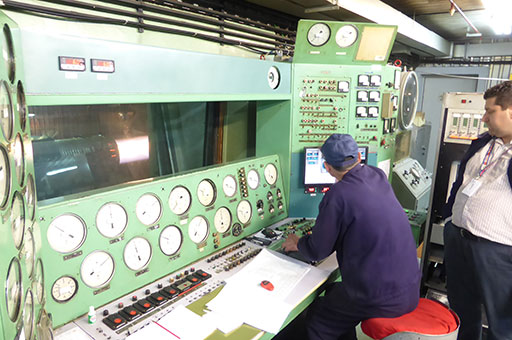
Grigore Filip, Aerostar’s president and general director, confirmed that he wanted to ensure the company’s future role as a subcontractor the company’s that already include Airbus, GKN/Fokker, Aerotech and Messier-Dowty for landing systems. “We look to develop our manufacturing activities and have already made much investment in the acquisition of machinery and equipment – and in the qualifying processes,” he said.
Software too is important, and at the time of our visit the world had been enduring a spate of cyber ‘hacks’ into all types of industry. A local Renault plant in Pistesti had been effected and had lost production for a number of days. “I am concerned about computing and cyber attack, so we protect against that,” he said. The company already separates its internal and external networks.”While this does inflict some constraints, it is very good,” he said.
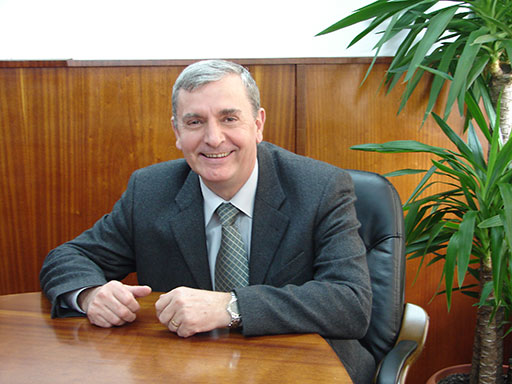
The MIG Legacy
Aerostar has been providing MRO services for the Romanian fleet of MIG-21 LanceRs since it was selected by the Romanian government to upgrade the entire fleet of 110 aircraft In November 1993. Around half still remain in service with each jet returning after around 600 hours. Engines return in half that time – about 300 hours.
Romania is in the process of building a new fleet of Lockheed Martin F-16 Fighting Falcons but only 12 have been purchased so far. These aircraft, from the Portuguese Air Force, comprise 12 used F-16AM/BMs, nine single-seat and three dual-seat versions.
Sfirlea said that when each aircraft returns to Bacau, on average every seven and a half years, it is fully stripped down, inspected and overhauled then reassembled. In total, Sfirlea estimates that the plant has overhauled MIG-21s around 3,500 aircraft, and 6,500 for the Tumansky R11-300 engines (on average there are two engines per aircraft). “The engines are rated for six years between overhauls. The aircraft comes back after 600 flying hours and the engine 300 hours – so during the time between overhauls each aircraft will fly with two engines assigned to it.”
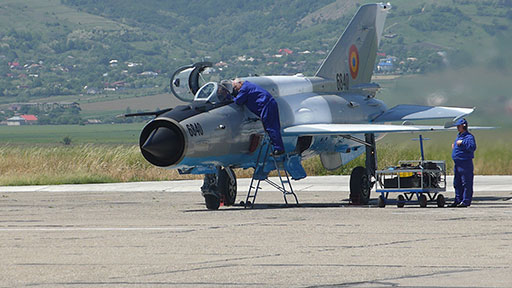
The engine test unit is a mix of old and new. The original Soviet era test dials are still in place, but the monitoring and testing system has been overhauled at least twice and now provides much more accurate digital readouts.
Catalin Zota, operational director of the aero products division said that a full test for each engine through the facility lasts for a maximum of 25 hours during which all engine parameters are checked. It takes approximately 73 days for the complete strip down, repair and test of each engine stated Zota.
Expansion plans
Grigore Filip, Aerostar’s president and general director is driving the company’s expansion. During our conversation at the end of the tour, he revealed that plans are now unfolding to expand Aerostar’s MRO business beyond its currently base to a new facility located at Iasi airport, around 130km to the north of Bacau.
Filip revealed that the company was in final negotiations with the Iasi airport authorities over a plan to build a new four-bay hanger. “Based on our analysis, this is a good place to expand the business into another location,” said Filip. “We are now in the final stage of concession [talks] for the land.” When the application is approved, the main investment and building work will begin in 2018. “We will be ready for business in Iasi in 2019,” he stated.
Analysis conducted by Aerostar indicated that the new airport provided a good location and that the town’s university would also be a good source of potential new employees. Once completed, it will provide MRO facilities for the Airbus A320 family and Boeing 737 Classic and New Generation aircraft. It is not planned to conduct military MRO or part manufacturing at the site. However, the addition of another hanger would represent around a 50 percent expansion in Aerostar’s MRO current capacity, increasing the number of aircraft bays from seven to 11.
When asked whether the company would consider the conversions business, Filip said while conversions were interesting, “we can bring more value in heavy maintenance which lets us apply our competitive advantage and comply with delivery terms. This does not transfer to conversions where costs apply.” He said that he was aware of several Boeing 737 conversions on the market but he believed that they could not be done competitively due to the heavy cost involved.
“We make investments made step by step – we invest to win a contract, but that will be something we are fairly sure of before making the investment. At this time the company provides 100 percent of its own funding and there is no programme in Romania to attract EU funding,” he said, adding that “there is a lot of competition so we cannot wait.
Filip concluded that the future will have the same balance: 50 percent production; 25 percent defence; and 25 percent in civil MRO. Manufacturing will remain in Bacau. “We have a growing amount of business which is why we are taking the opportunity for the new hanger. Each project has its own requirements and investment depends on demand.”
